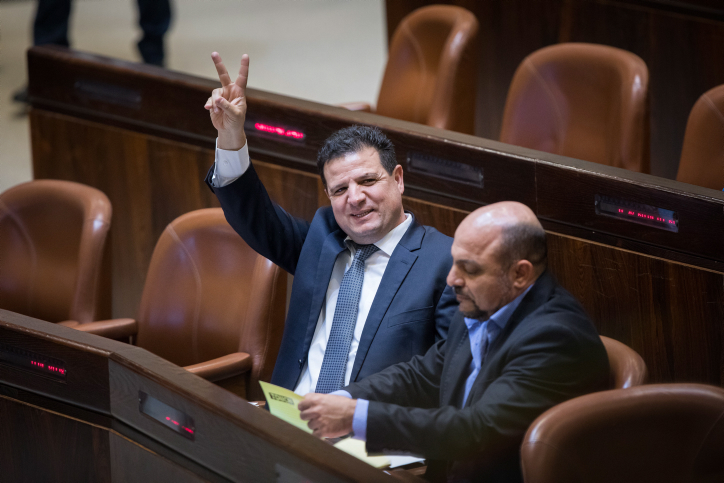Joint List Chairman Ayman Odeh said he would be willing to consider joining a center-left coalition, prompting a response from Israel’s centrist party that reveals the true face of those who hope to replace Netanyahu.

I do not know whether Joint List Chairman Ayman Odeh is a diligent paramedic or a doctor preparing for the long-term treatment of a 72-year-old patient suffering from chronic illnesses such as racism and Zionism. In either case, the patient is suddenly showing signs of life.
All it took was a single interview with Odeh with a top journalist in one of Israel’s largest newspapers last week, in which the member of Knesset said he would join a center-left coalition under certain conditions, to throw his party directly into the lion’s den of Jewish Israeli electoral politics.
His first condition for joining the coalition was that the government would work toward ending the occupation and establishing a Palestinian state. This should sound familiar to both Prime Minister Netanyahu — who committed to those very ideas in his Bar Ilan speech — as well as the Labor Party.
But in today’s messianic State of Israel there is no such thing as “ending the occupation” or, God forbid, “peace.” There is annexation, settlements, closure, and managing the occupation under the guise of Trump’s so-called “deal of the century.” There is not a single Zionist party in Israel who speaks about removing settlements or even freezing settlement construction. Odeh’s condition should have taken the option off the table.
Odeh said that under a center-left coalition that would include the Arab parties, Palestinian citizens of Israel would no longer be second-class citizens. Wouldn’t this, as the Balad party has long advocated, be the state of all citizens we all want so badly? After all, the “citizens” Odeh represents also want to be able to rule the country. What’s wrong with that?
Unfortunately, Odeh’s vision is unfounded, since the Jewish state is unwilling to allow its non-Jewish citizens to take part in ruling. After all, the mechanisms of the state were built and maintained in order to preserve pure Jewish sovereignty. Balad quickly made clear that it would oppose any government run by what it called “occupying generals,” distancing itself from the leader of the Joint List they belong to.
Yet a quick glance on social media revealed a relatively small number of people who vocally opposed Odeh’s comments. The Islamic Movement and Ahmad Tibi’s Ta’al party, both part of the Joint List as well, did not reject Odeh’s comments. On the one hand, they said they would not oppose joining a center-left coalition or a political alliance that would block the establishment of a right-wing government. On the other hand, they said the conditions for doing so had not yet ripened, adding that discussing the possibility of joining the coalition is not relevant at this time.
It took the Joint List 48 hours to issue an official response to the controversy. By that time, Blue and White, the centrist party that hopes to beat Netanyahu’s Likud party in next month’s elections, had already distanced itself from Odeh and his party, while Likud warned against the possibility that the center would link up with the Arabs. According to the Joint List, Odeh’s statements exposed the way in which both Likud and Blue and White view Israel’s Arab public, saying that the competition between the two is based on the exclusion of Palestinians from the political arena. While Likud wants to disqualify the Joint List from running, Blue and White is simply unwilling to work with Palestinians.

The response further stated that the Joint List “will not hesitate to seize any parliamentary opportunity to advance the interests of our people in due course,” and that the its demands from the ruling party will be determined “together” following the results of the upcoming elections. It seems they seem to have forgiven Odeh for “acting out.” From now on, if you believe them, they’re working together.
Odeh’s second, far more realistic condition was to repeal the Jewish Nation-State Law — a demand tens of thousands of Palestinian citizens . But he didn’t stop there: Odeh then proceeded to list a number of demands that don’t actually require him to be part of the coalition, such as stopping the penalization of illegal home construction (which disproportionally affects Palestinian citizens), and putting an end to violence and crime inside the Arab community.
The probability that a center-left coalition will come into being following the elections is close to zero — and not because of the right, which has ruled Israel for nearly 20 years, but because Israel has neither a political center nor a formidable left. Blue and White head Benny Gantz, who is supposed to represent the moderate center, says he will “crush” Gaza. The former IDF chief of staff doesn’t talk about ending the occupation, which he has spent his professional life helping to maintain, and has already stated that he would not sit alongside Arab parties in the government.
The sudden turbulence in this dormant election campaign has, at the very least, revealed the true face of all those who purport to be able to replace the right. It is also an opportunity to remember that center-left politicians Isaac Herzog, Tzipi Livni, Avi Gabbay and Benny Gantz all promised a political revolution without the Arab parties — just before they found themselves on the benches of the opposition alongside those very same Arab parties.
Odeh told Local Call that he is happy with the responses to his interview, adding that a situation in which 75 percent of Arab citizens were willing to negotiate with the government and 40 were willing to join a right-wing government would be a dangerous trend for Arab society (according to a joint Local Call-+972 poll conducted before the previous elections, 47 percent of Arab citizens were ready to vote for Jewish parites, while 87 percent supported Arab parties joining the government).
Odeh says that he “wanted to show the Arab voters that we can use politics to promote our interests and we do not need to vote for Jewish parties. On the other hand, Likud went crazy in its response [to Odeh’s remarks – S.S], and Blue and White are now embarrassed. At least the burden of proof is on them… the public will judge them on election day.” Regardless of the outcome of the elections, the ball is now in Blue and White’s court.
A version of this article was first published in Hebrew on Local Call. Read it here.


